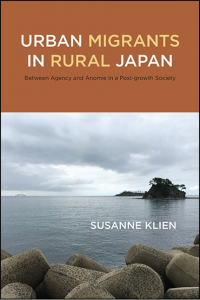Urban Migrants in Rural Japan: Between Agency and Anomie in a Post-growth Society
By Susanne Klien
**Awarded 2020 CHOICE Outstanding Academic Title in the US**
 Summary
Summary
Offers an in-depth ethnography of paradigm shifts in the lifestyles and values of youth in post-growth Japan.
Urban Migrants in Rural Japan provides a fresh perspective on theoretical notions of rurality and emerging modes of working and living in post-growth Japan. By exploring narratives and trajectories of individuals who relocate from urban to rural areas and seek new modes of working and living, this multisited ethnography reveals the changing role of rurality, from postwar notions of a stagnant backwater to contemporary sites of experimentation. The individual cases presented in the book vividly illustrate changing lifestyles and perceptions of work. What emerges from Urban Migrants in Rural Japan is the emotionally fraught quest of many individuals for a personally fulfilling lifestyle and the conflicting neoliberal constraints many settlers face. In fact, flexibility often coincides with precarity and self-exploitation. Susanne Klien shows how mobility serves as a strategic mechanism for neophytes in rural Japan who hedge their bets; gain time; and seek assurance, inspiration, and courage to do (or further postpone doing) what they ultimately feel makes sense to them.
“This book is a valuable contribution to knowledge about diversifying rural Japan and evokes reflection about the future of post-growth Japan. Klien’s study benefits from assiduous and long-term field research and insightful analysis. She excels at locating the specifics of the study in theoretical observations and concepts, thereby setting the work into a larger consideration of Japan’s paradigm shifts in lifestyle and values.” — Nancy Rosenberger, author of Gambling with Virtue: Japanese Women and the Search for Self in a Changing Nation
Table of Contents
Acknowledgments
Introduction
2. The Countryside between Aging, Lack of Perspectives, and Creative Depopulation through the Lens of Female Settlers
3. Post-Growth Forms of Living and Working: Countryside as Experimental Ground and Social Imaginary
4. Between Agency and Anomie, Possibility and Probability: Lifestyle Migrants and the Neoliberal Moment
5. Convergence of Work and Leisure: Blessing or Plight?
6. Liminal Belonging and Moratorium Migration: Lifestyle Migrants between Limbo and Purpose of Life
7. Social Entrepreneurs between Self-Determination and Structural Constraints: Examples from Miyagi and Tokushima Prefectures
Conclusion: Deconstructing Japan’s Rural-Urban Divide
References
Index
Details: http://www.sunypress.edu/p-
